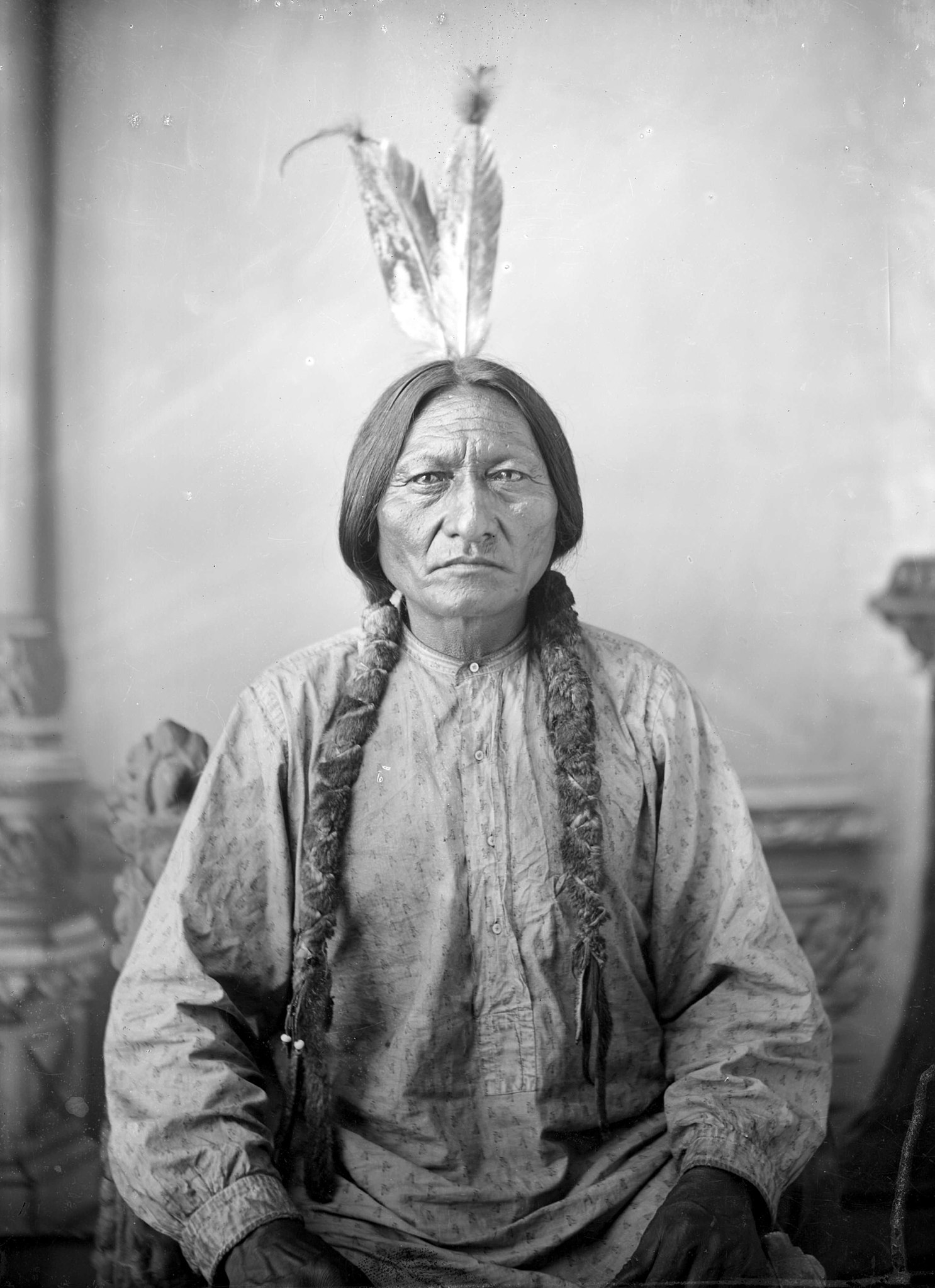More languages
More actions
(Created) Tag: Visual edit |
(Updated pages using birthname parameter instead of birth_name when using Infoboxes) |
||
| Line 1: | Line 1: | ||
{{Infobox politician|name=Sitting Bull|native_name=Tȟatȟáŋka Íyotake|image_size=200| | {{Infobox politician|name=Sitting Bull|native_name=Tȟatȟáŋka Íyotake|image_size=200|birth_name=Ȟoká Psíče|birth_date=c. 1831|birth_place=Grand River, Dakota Territory, [[USA]]|death_date=December 15, 1890|death_place=[[Standing Rock Reservation]], [[South Dakota]], USA|nationality=[[Lakota]]|political_orientation=[[Anti-colonialism]]|image=Sitting Bull.png}} | ||
'''Tȟatȟáŋka Íyotake''' (c. 1831 – December 15, 1890), known in English as '''Sitting Bull''', was a Hunkpapa Lakota leader who fought against U.S. [[Settler colonialism|colonizers]]. Along with [[Crazy Horse]] (''Tȟašúŋke Witkó''), he led the Lakota and Cheyenne to defeat [[George Armstrong Custer|Custer]]'s Seventh Cavalry at the Battle of Little Bighorn. He later went into exile in [[Canada]] but returned to his homeland in 1881. The United States put him under house arrest and then killed him in 1890.<ref name=":03">{{Citation|author=[[Roxanne Dunbar-Ortiz]]|year=2014|title=An Indigenous Peoples' History of the United States|chapter="Indian Country"|page=151–4|pdf=https://www.lcps.org/cms/lib/VA01000195/Centricity/Domain/10601/An%20Indigenous%20Peoples%20History%20of%20the%20United%20States%20Ortiz.pdf|city=Boston, Massachusetts|publisher=Beacon Press|isbn=9780807000403}}</ref> | '''Tȟatȟáŋka Íyotake''' (c. 1831 – December 15, 1890), known in English as '''Sitting Bull''', was a Hunkpapa Lakota leader who fought against U.S. [[Settler colonialism|colonizers]]. Along with [[Crazy Horse]] (''Tȟašúŋke Witkó''), he led the Lakota and Cheyenne to defeat [[George Armstrong Custer|Custer]]'s Seventh Cavalry at the Battle of Little Bighorn. He later went into exile in [[Canada]] but returned to his homeland in 1881. The United States put him under house arrest and then killed him in 1890.<ref name=":03">{{Citation|author=[[Roxanne Dunbar-Ortiz]]|year=2014|title=An Indigenous Peoples' History of the United States|chapter="Indian Country"|page=151–4|pdf=https://www.lcps.org/cms/lib/VA01000195/Centricity/Domain/10601/An%20Indigenous%20Peoples%20History%20of%20the%20United%20States%20Ortiz.pdf|city=Boston, Massachusetts|publisher=Beacon Press|isbn=9780807000403}}</ref> | ||
Latest revision as of 23:28, 3 April 2024
Sitting Bull Tȟatȟáŋka Íyotake | |
|---|---|
 | |
| Born | Ȟoká Psíče c. 1831 Grand River, Dakota Territory, USA |
| Died | December 15, 1890 Standing Rock Reservation, South Dakota, USA |
| Nationality | Lakota |
| Political orientation | Anti-colonialism |
Tȟatȟáŋka Íyotake (c. 1831 – December 15, 1890), known in English as Sitting Bull, was a Hunkpapa Lakota leader who fought against U.S. colonizers. Along with Crazy Horse (Tȟašúŋke Witkó), he led the Lakota and Cheyenne to defeat Custer's Seventh Cavalry at the Battle of Little Bighorn. He later went into exile in Canada but returned to his homeland in 1881. The United States put him under house arrest and then killed him in 1890.[1]
References[edit | edit source]
- ↑ Roxanne Dunbar-Ortiz (2014). An Indigenous Peoples' History of the United States: '"Indian Country"' (pp. 151–4). [PDF] Boston, Massachusetts: Beacon Press. ISBN 9780807000403
